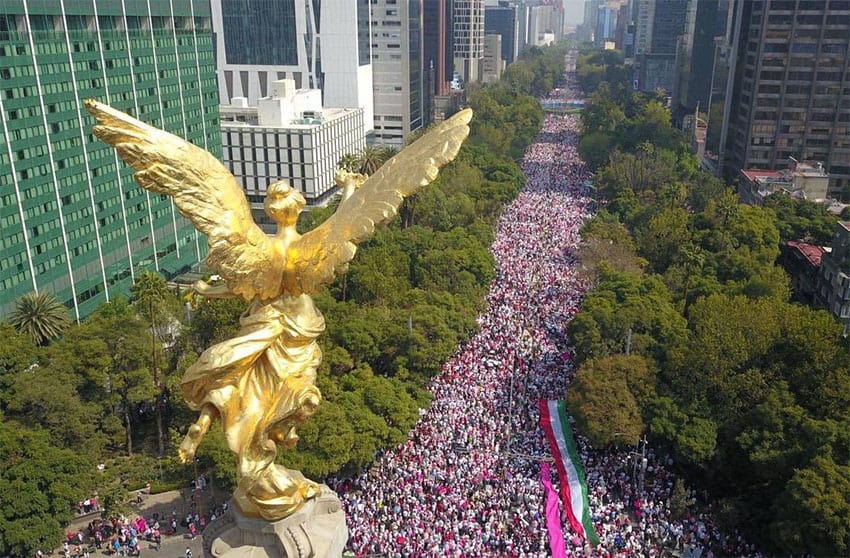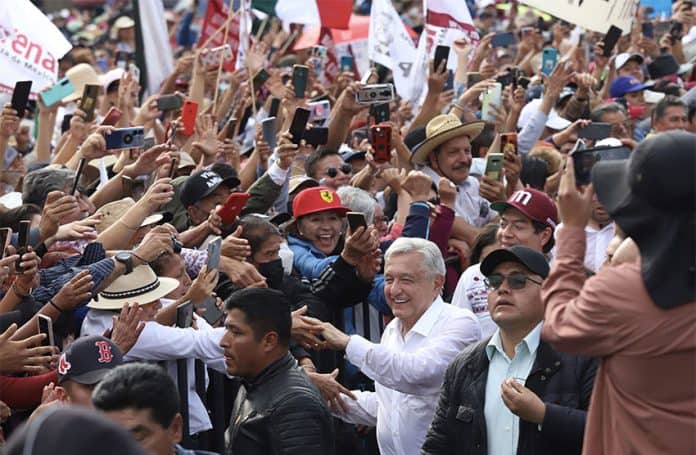Citizens from across the country took to the streets of Mexico City on Sunday to demonstrate their support for the federal government and President López Obrador just days before he celebrates the fourth anniversary of his six-year term.
Around 1.2 million people joined the president in marching from the Angel of Independence on Reforma Avenue to the capital’s central square, the Zócalo, according to Mexico City Mayor Claudia Sheinbaum, one of numerous high-ranking officials — and a few presidential hopefuls — who completed the four-kilometer trek.
“Something historic occurred today in Mexico City — the march for four years of the transformation with the President Andrés Manuel López Obrador,” Sheinbaum said in a message posted to social media Sunday evening.
“I’ve just received the report from the Ministry of Citizen Security, there was no problem, not even one window was broken, and about 1.2 million people from the 31 states of the republic and Mexico City marched,” she said.
Some reports cited significantly lower attendance figures, such as tens or hundreds of thousands.
In any case, huge numbers of people were bused into the capital from around the country for the event, which was dubbed a contramarcha, or counter-march, because it took place two weeks after hundreds of thousands of people took to the streets to protest the government’s proposed electoral reform, legislation that would replace the National Electoral Institute and state-based electoral authorities with one centralized body.
Critics say the reform is designed to give the president and the party he founded — the National Regeneration Movement, or Morena — more control over the nation’s electoral authorities and system. The proposed legislation is one of numerous points of contention between supporters and detractors of the president, who has maintained a majority approval rating throughout his presidency even as he governs a nation of increasingly polarized citizens.
López Obrador initially called for people to come out in defense of the proposed reform, but said last week that the march wasn’t “about the electoral reform,” and instead enumerated 16 reasons why citizens should demonstrate their support for the “Fourth Transformation” of Mexico that he says his administration is implementing.

Morenistas, as supporters and members of the ruling Morena party are known, various unions and other citizens’ groups heeded his advice by organizing road trips to the capital and finding people to fill some 1,800 buses, according to a Reforma newspaper report.
“In many cases the transportation was provided by local governments or politicians who wanted to be well thought of inside the ruling party,” the Associated Press reported.
Although many people undertook long, tiring journeys to get to the capital, a festive mood prevailed as the marchers swarmed down Reforma Avenue and into the historic center of Mexico City, with music, singing and chants of “Es un honor estar con Obrador” (“It’s an honor to be with Obrador”) adding to the atmosphere.
Supporters swamped the president, making it difficult at times for him to make any progress toward the Zócalo, which he finally reached five hours after setting off from the Angel of Independence shortly after 9 a.m.
“The president is from a humble background. He’s done a lot of social programs,” Teresa Magana, who traveled to the capital from AMLO’s home state of Tabasco, told the Reuters news agency.
“We want him to continue” as president, she added, even though the Mexican constitution precludes presidents from serving more than one six-year term.
Clara Jusidman, founder of a democracy, development and human rights-focused NGO, told the Associated Press that many people felt compelled to participate in the march because they benefit from the government’s welfare programs.
During an address in the Zócalo on Sunday afternoon, López Obrador reiterated his commitment to leaving office after six years, declaring that he and members of his government are maderistas, adherents of the revolutionary and former president Francisco I. Madero, who championed the “Effective suffrage, no re-election” maxim.
Ríos de gente consciente que la transformación es obra de un pueblo y no de un solo hombre; multitudes de sueños y convicciones caminando sobre Reforma y el Zócalo. Acompañando al hombre que ha cambiado a México y le ha dado un rostro humano y democrático #4AnosDeLaTransformacion pic.twitter.com/PhHKqAgAYd
— Jesús Ramírez Cuevas (@JesusRCuevas) November 28, 2022
In an almost 100-minute speech to mark “four years of transformation” — AMLO took office on Dec. 1, 2018 — the president outlined “110 actions and achievements of this government,” among which he said were the implementation of various programs to support the nation’s neediest people, the rollout of COVID-19 vaccines, sound management of public finances including via austerity measures, investment in infrastructure, the creation of the National Guard, protection of the environment, the reduction of crime (although homicides reached a new record high in 2019) and the termination of “luxuries in the federal government.”
“Friends, politics is, among other things, thought and action, and even though deeds are the most important thing, it’s also important to define, in theoretical terms, the model of government we’re putting into practice,” López Obrador told government supporters who packed into the central square located opposite the National Palace, the seat of executive power.
“My proposal would be to call it Mexican humanism, because we have to look for a distinctive feature,” he said.
“… Nourished by universal ideas, the essence of our project comes from our millenary cultural greatness and our exceptional and fertile political history,” López Obrador said.
“… We maintain that progress without justice is a backward step. Our thesis is that economic growth isn’t enough, but that justice is essential. In the new economic, moral and social policy we’ve implemented from the start of our government, the technocratic obsession of measuring everything in terms of growth indicators that don’t necessarily reflect social realities has been discarded,” he said.
“We believe that the most important thing is not quantitative but qualitative. In other words, the equitable distribution of income and wealth. The ultimate aim of a state is to create the conditions so that people can live happily and free of misery and fear,” López Obrador said.
“On the other hand, … banishing corruption and privileges is fundamental in order to allocate all [the money] … saved to benefit the majority of the people and specifically, the poorest and most marginalized,” he added before concluding his address with three customary cries of “¡Viva México!”
With reports from Reforma, La Jornada, AP and Reuters
